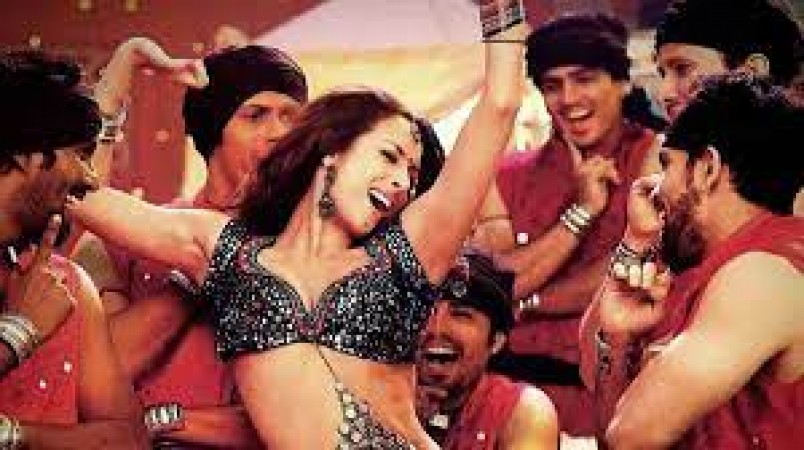
Bollywood music is a genre where songs frequently have a major impact on a movie's popularity and box office performance. Among the many legendary songs to grace Indian cinema, "Munni Badnaam Huyee" from the movie "Dabangg" stands out as a chart-topper that gained instant fame. However, many people might not be aware that this upbeat song is actually a remake of "Lounda Badnaam Hua" from the movie "Rock Dancer," which was in turn inspired by "Larka Badnaam Hua" from the Pakistani movie "Mr. Charlie." In-depth analysis of the development of this iconic Bollywood song and an examination of its cultural influence are provided in this article.
The Pakistani movie "Mr. Charlie," which came out in 1969, is where "Munni Badnaam Huyee" got its start. In this movie, there was a song called "Larka Badnaam Hua," which is Hindi for "The Boy Has Been Disgraced." Playback singer Ahmad Rushdi performed the song, which was written by renowned composer Nisar Bazmi and quickly gained popularity in Pakistan.
The song's lyrics describe a young man who, as a result of his carefree and flirtatious behavior, has developed an infamous reputation in his hometown. "Larka Badnaam Hua" laid the groundwork for the song's eventual transformation into a Bollywood hit, even though it may not have attracted immediate attention outside of Pakistan.
More than 20 years later, Bollywood seized the chance to turn "Larka Badnaam Hua" into a song that would resonate with Indian listeners. The song was given a new home in the 1995 movie "Rock Dancer." "Lounda Badnaam Hua," written by Bappi Lahiri with playback vocals from Amit Kumar and Alka Yagnik, kept the original's catchy rhythm and upbeat tune while incorporating its own Bollywood flair.
In "Rock Dancer," Ronit Roy, who plays the lead in the movie, uses the song as a lively dance number to display his skills as he moves to the upbeat melody. Because of its catchy rhythm and lyrics about someone having their reputation tarnished, Bollywood fans fell in love with the song right away.
The song underwent the biggest transformation when it was included in the 2010 Bollywood hit "Dabangg." The song "Lounda Badnaam Hua" was rewritten by the composers Sajid-Wajid and the lyricist Lalit Pandit as "Munni Badnaam Huyee," preserving the original's essential elements while adapting it to the circumstances of the movie.
In "Dabangg," a crucial scene called "Munni Badnaam Huyee" featured Malaika Arora and Salman Khan performing a scorching dance routine. The energetic beats, memorable lyrics, and catchy beats of the song made it an instant hit. This updated version, which featured playback singers Mamta Sharma and Aishwarya Nigam, became a chart-topper that was well-liked by viewers all over India and beyond.
The evolution of "Larka Badnaam Hua" into "Munni Badnaam Huyee" is evidence of how music in the Indian film industry is flexible and adaptable. The journey of this song reflects the dynamic nature of cultural exchanges between India and its neighbors. Bollywood frequently draws inspiration from a variety of sources.
"Munni Badnaam Huyee" developed into more than just a song; it also influenced popular culture. It quickly became a favorite at weddings, parties, and dance performances thanks to the upbeat song and Malaika Arora's well-known dance moves. The song's appeal cut across national boundaries and even entered into global pop culture.
The success of the song also sparked a renewed interest in the original songs, "Larka Badnaam Hua" and "Lounda Badnaam Hua," which had previously received less attention outside of their respective home countries. This revival bridged the gap and fostered respect for musical traditions on both sides by bringing Pakistani and Indian songs into a common cultural space.
The transition from "Larka Badnaam Hua" in "Mr. Charlie" to "Munni Badnaam Huyee" in "Dabangg" is evidence of the enduring influence of music in storytelling and cross-cultural interaction. It is a prime example of how universally recognizable works of art can be created by a catchy tune and lyrics that are relatable to everyone.
Whether it is the song's original Pakistani rendition, a Bollywood adaptation, or a contemporary remix, each version preserves a portion of its cultural history while bringing a fresh new flavor to the song. In the history of Bollywood, "Munni Badnaam Huyee" will always be remembered as a song that honored its Pakistani cinematic roots while bringing happiness, dance, and celebration to countless hearts.
The development of this song serves as a reminder that music transcends national and cultural boundaries and has the ability to bring people together through their appreciation of melody and rhythm, regardless of their origins. "Munni Badnaam Huyee" is proof of the appeal of music to all cultures and its capacity to unite people in a spirit of joy and celebration.
Realizing the True Worth of Family: 'Raamprasaad Ki Tehrvi'
The Many Shades of Vikrant Massey: Some Movies for Your Watchlist
Shah Rukh Khan's "Jawan" Sees a Drop in Global Box Office Numbers on Day 2